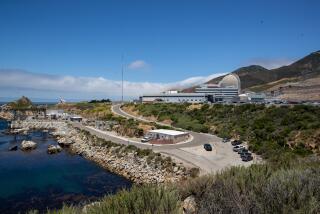Three Mile Island, 9 Years Later: Public Interest Cooled But Reactor Remains ‘Hot’
- Share via
WASHINGTON — For the 11 members of a panel of private citizens, scientists and elected officials, the cleanup of the contaminated Three Mile Island nuclear reactor has become the never-ending story.
It has been nearly 10 years since an accident at the TMI Unit 2 reactor caused panic in communities near the Pennsylvania plant and raised questions about the risks involved in producing nuclear power.
Since then, the Advisory Panel for the Decontamination of Unit 2 has met perhaps 60 times.
Along the way, most people--except those with property near the plant--seem to have lost interest in what happens to the contaminated reactor.
“At our (early) meetings we would have the full media blitz,” Joel Roth, panelist from Elizabethville, Pa., said. “Now we have some of the local people.”
When Three Mile Island was a hot issue, people jammed Nuclear Regulatory Commission meetings to voice their concerns. In 1985, a demonstrator poured a reddish liquid he called “symbolic blood” on the commissioners’ meeting table before the NRC approved the restarting of the undamaged Unit 1 reactor. Photographers recorded the protest.
No Crowd at Meeting
No photographers or activists showed up when the advisory panel met recently in suburban Washington to brief the NRC on the cleanup activities.
The panel was appointed the year after the March 31, 1979, accident, in which Unit 2 was allowed to lose vital cooling water that is supposed to cover the reactor core. The $1-billion cleanup effort has been focused largely on removing fuel from the damaged core, water decontamination and shipping wastes off the site.
The panel’s job is to collect the views of the public “and afford Pennsylvania government officials an opportunity to participate in the commission’s decision-making process regarding cleanup plans,” according to the NRC.
Headed by Lancaster, Pa., Mayor Arthur Morris, the panel includes scientists, local elected officials and residents. Thomas Gerusky, director of the Pennsylvania Bureau of Radiation Protection, represents the state on the panel.
Serving Without Pay
The members get no compensation for their time; the NRC pays expenses when they travel.
“We just want to carry on something that has been going on for 10 years. We want to see it through to the very end,” said Roth.
TMI managers plan to end the cleanup next year, and the question now is what to do with Unit 2 after that.
GPU Nuclear, operator of the plant near Harrisburg, Pa., has proposed mothballing the plant for perhaps 30 years. That way, radiation in the reactor building basement would be given time to decay and Unit 2 could be dismantled at the same time as its undamaged twin, Unit 1, which is expected to operate at least another 20 years.
But members of the advisory panel have refused to back the utility’s plan.
At their recent meeting, panelists said the utility has not been specific enough about how long Unit 2 might be in storage. They said there is no guarantee that the plant cleanup would be finished in 30 years, or even 40 years.
Long-Term Radioactivity
While much progress has been made, the panelists said, some radiation remains--and will remain during the storage phase--in pipes and other parts of the reactor. No money has been set aside to eliminate that plant radiation in the future, the panelists said.
The utility said it is working on a spending plan, and that it is pointless to continue to expose cleanup workers to radiation when the plant could be locked up for years with no risk to the public.
Morris, the panel’s chairman, said the utility “has got to go back, and they’ve got to sit down and say, ‘Jeez, we’ve got to take another look at this (plan).’ ”
Also at the recent meeting, the issue of the panel’s very existence was raised. Morris asked NRC Chairman Lando Zech whether he believed that the body still served a useful purpose.
Zech said he hopes that the group continues to serve indefinitely.
More to Read
Sign up for Essential California
The most important California stories and recommendations in your inbox every morning.
You may occasionally receive promotional content from the Los Angeles Times.













